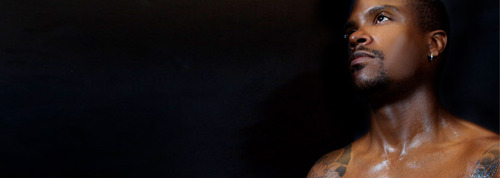Born in Detroit in 1970, revered DJ-producer Quentin Harris grew up as something of a child music prodigy. So the story goes, he taught himself the piano (from the age of five) to such a level that at the time of taking lessons (at 12) he was already more advanced than his teachers. Inevitably, his budding rap star uncle bundled him into the studio to drop synth lines on demo tracks he was recording, but Harris was soon controlling all aspects of their sound and arrangement – like a producer.
It wasn’t only hip-hop the young Harris encountered. The soulful sweep of Ken Collier, resident DJ at local joint Heaven (Detroit’s answer to ‘John Peel’), made an almighty impression, so too the obscure disco soundtracking his nights out at the roller-disco. Harris started singing, playing the trumpet, producing local groups (one of which he got signed to a major label), and working with prominent producer Michael Powell. His lowly internship with Powell soon progressed to playing on sessions for everyone from Aretha Franklin to the Biochemists. It also led to supplying beats for New York hip-hop collective Master Minds; then producing their next album and becoming their tour DJ. It was the late Nineties.
If Harris’s official sound was hip-hop, R&B and pop, then he was also inspired by house DJs such as Timmy Regisford, Danny Tenaglia and David Morales. The edgy house demos he finally decided to share with luminaries from that scene met with frustrating political conservatism, prompting him to re-focus on hip-hop production but his dance music break was just around the corner.

Among his other musical commitments, Harris started working in key Big Apple dance music store Satellite Records. His actual artistic debut followed soon after, in 2002, a blistering 4-4 partnership with Tyrone Francis, ‘Sincere/Too Hott 2002’. Harris was still persisting with house and friendship with Ben Johnson – affiliated to Timmy Regisford’s Unrestricted/Restricted Access stable – fuelled his creative defiance. Harris’ subsequent soul-house remix of Donnie joint ‘Cloud Nine’ exploded – an ecstatic Regisford ‘premiered’ the velvety nine-minute meander 12 times in one night at Club Shelter and breakthrough pandemonium ensured.
Indeed, Harris was now DJing regularly at global hotspots Ministry Of Sound, Cielo and Stereo, not forgetting Shelter - famed for his highly technical mixing skills as much as his emotive, deeply soulful record choices. In 2005, he released ‘Let’s Be Young’ whose electric, string-led, wholly unique flow quickly topped the lofty heights of ‘Cloud Nine’. “I just thought I’d made another track” he told DJhistory.com in 2010. My colleague at the time had booked...flights to Miami but booked the hotel in the wrong month and I didn’t find out till the same day. Instead of getting angry I just said ‘you fix this right now’. And then started working on something and that’s what came out. There was a story behind it, it came out of frustration and anger. He was the one that thought it was amazing and different and I was like OK whatever.”
More underground hits were to come, not least ‘My Joy’ (2008) and ‘Can’t Stop’ (2008) – both through Strictly Rhythm – and ‘Do The Right Thing’ (2010). Prior to that came a stirring debut album No Politics (2006), the title reflecting label wrangles around the release but also Harris’ long-held view that pigeon-holing ultimately divides rather than shapes the music industry and therefore undermines it. No Politics was, Harris said, a window into its creator’s ‘crazy’ mind, delivering soulful fervour and finesse in refreshingly unexpected ways (not to mention collaborations with Knuckles, Morales and Tenaglia). His second album, 2010’s Sac*ri*fice, took two years to complete but whirled in similarly expressive, surprising ways at both the light and dark ends of the house spectrum – think Murk-meets-Prince but in Harris’ inimitable hard and soul fashion.
Little else has appeared from Harris’ studio since then, and the media interviews have markedly slowed. Certain commentators would point to Harris’ despondent public views at the time of Sac*ri*fice as an indication that he has lost further confidence with the scene in which he operates. In one interview he claimed he was losing some of his fanbase because, to his mind, the younger generation didn’t care about house’s roots – his roots – whilst the older generation didn’t want anything to do with some of the younger’s relevant new ideas: “One scene doesn’t respect the history and the other scene doesn’t cultivate youth.”
Yet Harris has continued to pursue his craft and pursue it well. DJ commitments have continued to land, reminding party-seekers around the world that a dancefloor can thrive on past, present and future when those elements are blended with skill, knowledge and, crucially, passion. Harris’ most recent itinerary has taken in Johannesburg (in South Africa he enjoys major celebrity status), Moscow, Miami, Chicago, Tokyo, Italy and Croatia. His upcoming date for Defected’s Glitterbox night at Booom! Ibiza is a further glorious meeting of mindsets – rules and boundaries do not exist, just great, great music and happy, thronging crowds.
All the while there is the growing promise of new studio output, Harris’ recent spot at Toronto’s World Pride 2014 event showcasing a few fresh production moves. One of house music’s deepest thinkers and boldest, most charismatic performers, Harris is as engaged as ever.
Words: Ben Lovett
Quentin Harris plays Glitterbox at Booom Ibiza Saturday 9 August - click for full line-up and tickets
Defected presents Glitterbox Ibiza 2014 is out 17 August (digital) on Defected Records - order from iTunes



